The Most Reliable Induction Ranges for 2025
January 10th, 2025 | 7 min. read
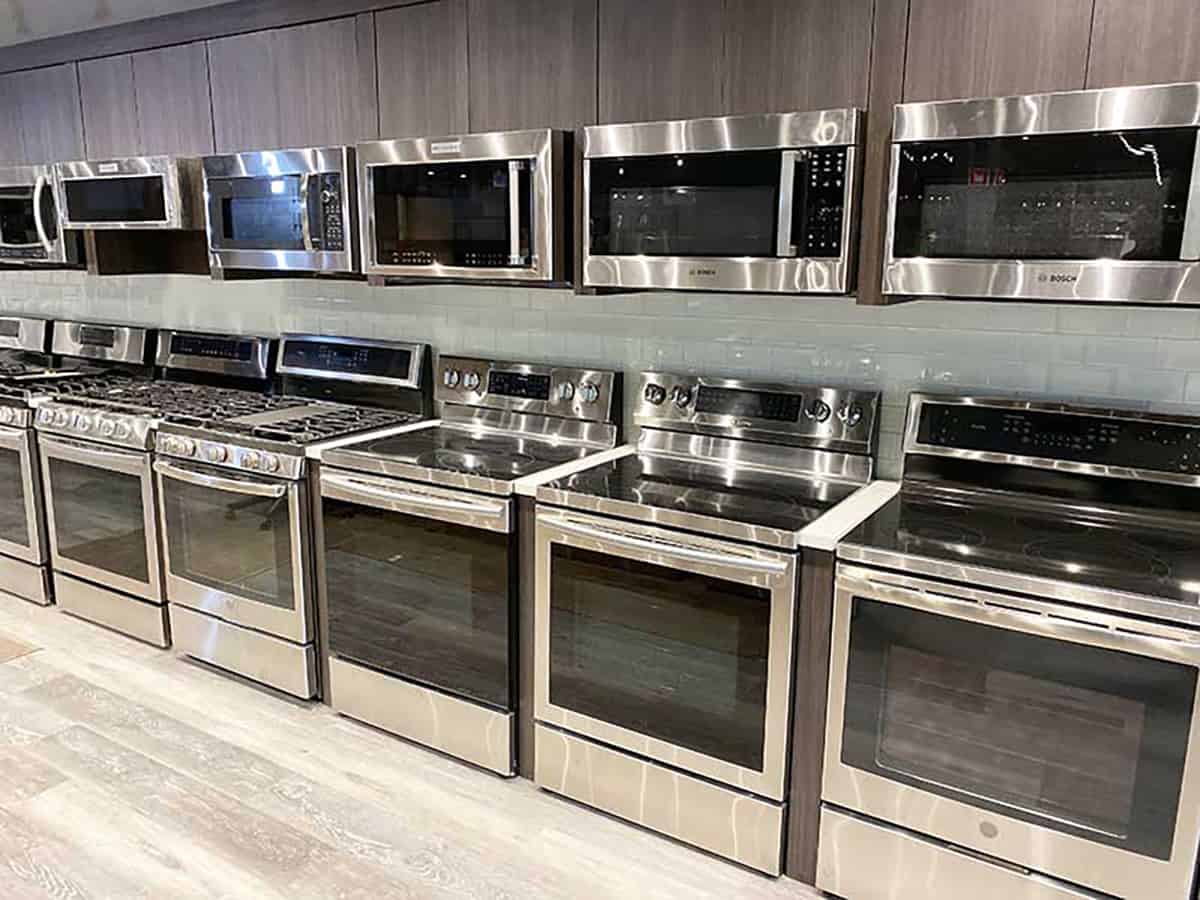
Induction ranges are faster with better-simmering capability, require less venting, and are the most child-safe and cleanable.
But are induction ranges reliable?
Our reliability numbers are based on over 33,000 service calls logged by our service department last year.
Let's get started.
How Induction Range Reliability Is Calculated
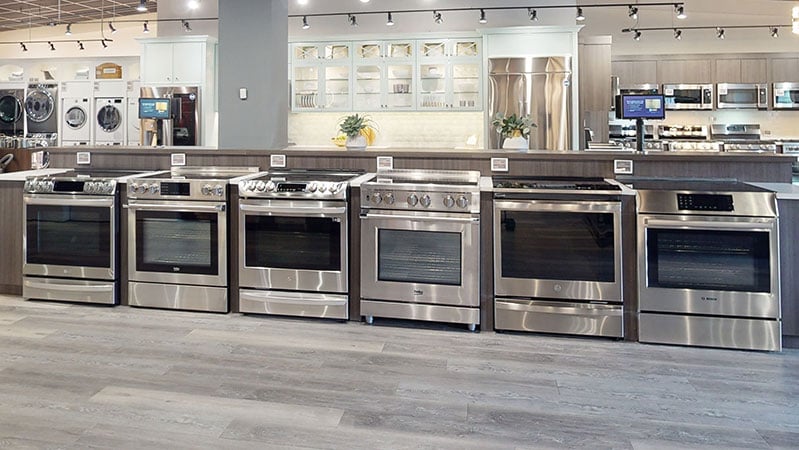
Measuring induction range reliability is simple.
We calculate reliability by comparing the number of products sold to the number of service calls for each brand over 12 months.
This timeframe is used because we provide free service during the first year under warranty.
After the first year, tracking service calls is harder since not all customers report issues directly to us.
Each visit by a service technician is recorded as a service call.
With 40 technicians, we service about 130-150 homes a day to repair appliances.
The Most Reliable Induction Range Brands for 2025
The following service rates are based on a minimum of 50 products sold and a total sample of over 800 products within 12 months.
| Service Rate | |
| LG | 6.3% |
| Bosch Benchmark | 9.3% |
| GE Profile | 11.4% |
| Thermador | 11.8% |
| Bosch | 12.2% |
| Fisher & Paykel | 13.6% |
| Café Appliances | 13.8% |
| Grand Total | 10.6% |
The average repair of an induction range is 10.6%. It's above the overall appliance service rate of 9%.
LG: 6.3%
Previous Service Rate: 5.2%
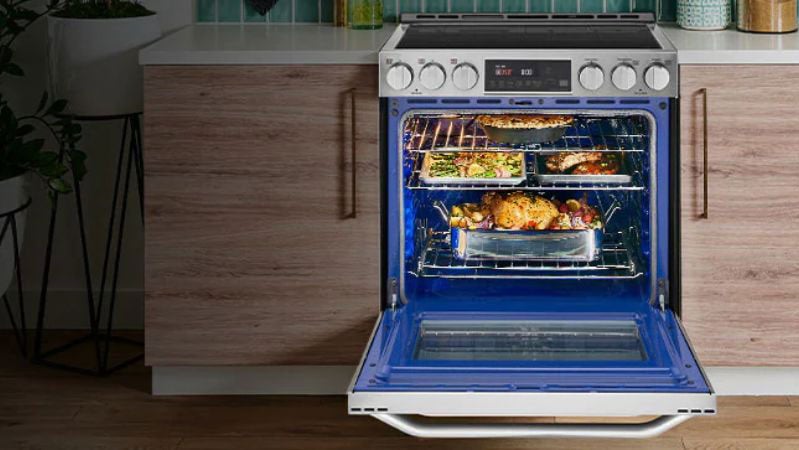
LG is the second most reliable brand for home appliances sold at Yale.
Over the years, LG has become more of an appliance company and less of a conglomerate.
They no longer make phones, for example.
LG manufactures more core elements like compressors and induction drivers than any other manufacturer.
That is the cornerstone of their success.
Their best feature is their massive 6.3 cubic foot oven.
Bosch Benchmark: 9.3%
Previous Service Rate: 14.7%
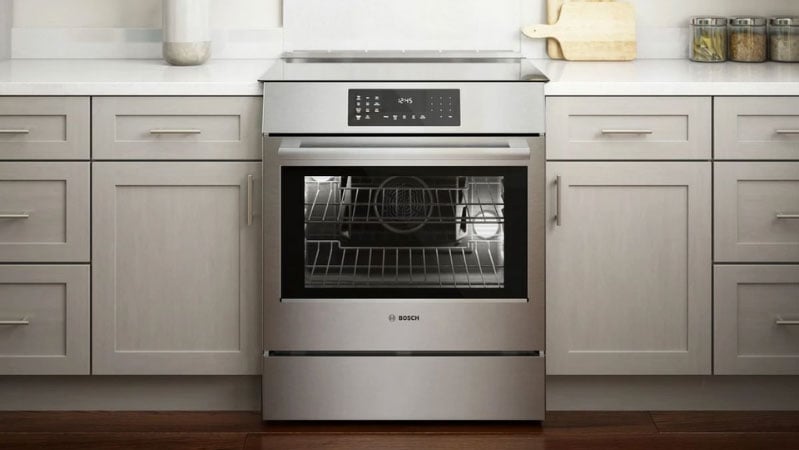
Bosch induction ranges are known for their exceptional quality, stylish appearance, and reasonable pricing.
Be careful: Bosch only manufactures half of their ranges as of late 2023.
SMEG of Italy manufactures their freestanding 800 series 30- and 36-inch ranges.
Make sure you know the difference. Italian ranges are not known for their reliability. They typically have smaller ovens with less durable construction.
GE Profile: 11.4%
Previous Service Rate: 10.8%
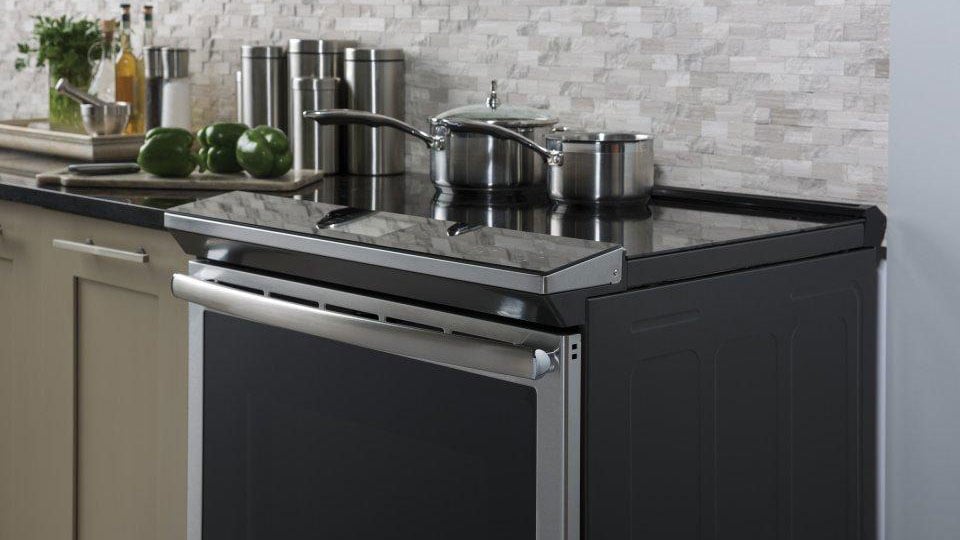
GE Profile is part of the trusted GE Appliances brand, renowned for its reliable products and excellent customer service.
The brand focuses on delivering practical features that make cooking easier and more efficient.
The PHS930YPFS is a popular induction range, offering four cooking zones, a Power Boil element for rapid heating, and Wi-Fi connectivity for added convenience.

Although its service rate is 11.4%, which is slightly above average, GE Profile currently provides its own service support.
However, they recently rebranded their service to 'Bodewell,' which - let’s be honest -probably doesn’t bode well (get it?) for consumers hoping for dependable appliance repairs.
Still, it's better than most.
Thermador: 11.8%
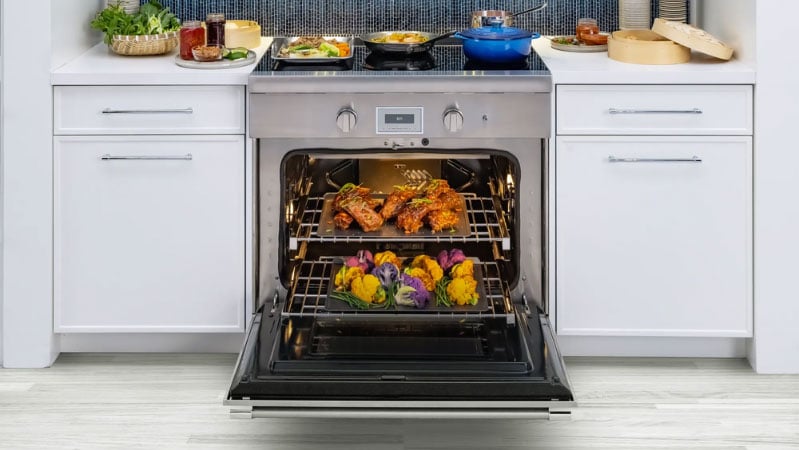
Thermador, part of the BSH Corporation, is renowned for its gas Star burners and highly flexible, reliable induction cooktops.
With a service rate of 11.8%, slightly above average, it remains a solid choice if you're seeking a high-quality induction range.
The Thermador Pro Harmony PRI36LBHU induction range offers a lot of flexibility.

With Liberty Technology, it allows you to cook with up to five pots, bridge zones for larger pans, or use Teppanyaki mode.
The MyZone feature automatically adjusts heat as you move your cookware, simplifying multi-step cooking.
It also features Wi-Fi connectivity through the HomeConnect app and a user-friendly TFT display.
Backed by the BSH Corporation, Thermador gives you the performance and convenience you need in your kitchen.
Induction Range Problems
The 3 main issues of induction ranges are:
1. Preheating Issues
Problem
Customers are experiencing long preheat times, inaccurate temperature settings, or issues with ovens reaching the desired temperature.
Potential Causes
- Not providing the correct time: The easiest rule of thumb is providing close to a minute an inch on preheats. 30” oven 30 minute preheat. This will help with even cooking, better rise, timing accuracy, and food safety.
- Thermostat or Temperature Sensor Malfunction: A faulty temperature sensor or thermostat can cause the oven to heat inaccurately, leading to incorrect or fluctuating temperatures.
2. Tripping Breakers
Problem
Massachusetts and many other states have a new electrical code that requires GFCI protection on new installations.
Many units trip the circuit breaker with what’s called nuisance trips, there is an addendum out in MA that authorizes the removal of these breakers if it presents itself.
Potential Causes
- Electrical Overload: Making sure there is the correct voltage and amperage that the unit is calling for. In addition, on a dedicated circuit if recommended.
- Faulty Wiring or Ground Faults: There could be issues with grounding or exposed wires, leading to short circuits and breaker trips. Often, these can appear as “nuisance tripping,” but repeated occurrences may indicate an underlying issue with the wiring in the unit.
3. Burner Issues
Problem
Burners are not heating consistently, not reaching high temperatures, or not functioning at all.
Potential Causes
- Pan Type-Magnetic Base: Induction-compatible pans must have a magnetic (ferrous) base. To check if your pan is induction-compatible, place a magnet on the bottom. If it sticks, the pan should work on an induction cooktop.
- Connection Issues: Loose connections or wiring issues between the control board and the burners can cause intermittent heating or failure to heat.
- Faulty Sensors in Induction Burners: For induction burners, issues often arise from improper sensor readings, particularly if the unit fails to recognize compatible cookware or if the temperature sensors in the burner are inaccurate.
Key Electrical Considerations
You need to carefully review the specifications before choosing an induction range.
These ranges usually require 40-50 amps, while electric ranges typically use 30-40 amps.
If your home experiences voltage spikes or electrical issues, an induction range could be more vulnerable.
Before you buy an induction range, make sure your electrical system is up to date and ready to handle the range's requirements.
Appliance Service
Appliance service is tough to find but an incredibly important part of your purchase.
Most people think of Yale as a sales company with five showrooms, but 2/3 of the company is service and installation.

When you shop for appliances, ensure service is part of the equation, especially with more difficult repairs like induction.
In Massachusetts, there are a few good service companies. Hunter, TOMA, and Poirier all have decent service companies.
Check Google, Yelp, and the Better Business Bureau (BBB) for service providers in your area.
Read More: Why Doesn’t Every Appliance Brand and Store Offer Service?
Should You Buy an Extended Warranty for an Induction Range?
The service rates suggest you may require service within five years.
Since induction transformers are expensive to repair, an extended warranty could theoretically pay for itself with just one repair.
However, most extended service contracts are managed by call centers that lack dedicated service technicians. In many cases, it’s better to save your money and avoid the hassle.
If you decide to purchase a warranty, you need to make sure it’s from a company that employs its own service technicians.
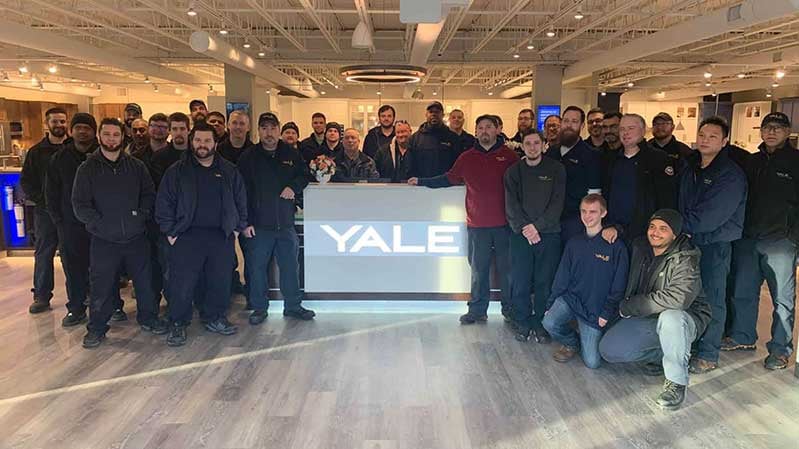
Do your research using Google Reviews or the Better Business Bureau (BBB). Just as your car dealership offers service, your appliance company should too.
Read More: Are Appliance Extended Warranties Worth the Cost?
Induction Range Benefits
1. Make-Up Air Compatible
Imagine this scenario: You’ve just completed a renovation in Massachusetts and installed a professional gas range with 600 CFM (Cubic Feet per Minute) of venting capacity.
The inspector asks about Make-Up Air - how will you replace the 600 CFM being vented out?
Unless your HVAC system includes a built-in return for make-up air, the inspector won’t sign off.
Even if you don’t live in Massachusetts, having make-up air is essential in energy-efficient homes to maintain clean, breathable air.
Induction ranges offer a solution. They are faster than professional gas ranges and emit less heat into the room.
This allows you to use a lower-capacity vent, such as 400 CFM, without worrying about make-up air requirements.
That said, for optimal indoor air quality, we always recommend adding a fresh air return to your home.
Learn More: Ventilation Buying Guide
2. Speed and Consistent Simmering Capabilities
Induction cooktops boil water faster than professional gas ranges while preventing the 40% heat loss that gas typically produces.
Like gas, induction offers precise, instant temperature control.
Unlike gas, which can extinguish itself at low settings, induction maintains a steady, low simmer effortlessly.
Read More: Induction vs. Professional Gas Cooking
3. Safety
Induction cooktops are among the safest options for families. A child cannot accidentally activate an induction burner without a metal pan on the surface.
Additionally, the glass surface doesn’t get as hot and cools much faster, reducing the risk of burns.
4. Cleanability
Unlike electric or gas cooktops, spills on an induction surface won’t bake onto the glass because it generates less heat. Cleanup is much simpler and faster.
Learn More: Induction Buying Guide
Key Takeaways
- Service Rates: The average induction range service rate is 10.6%, slightly higher than the overall appliance average (9%).
- Top Picks: LG, Bosch Benchmark, GE Profile, and Thermador are your safest bets for reliability right now.
- Check Your Circuits: Induction often needs 40–50 amps—more than many old-school electric ranges.
- Plan for Service: If you buy from a retailer that doesn’t offer service, at least figure out who can fix an induction range in your area.
Remember always make reliability and service an important part of your purchase. You will need service within the lifetime of an induction range.
FAQs
Answers to the most commonly asked questions about induction ranges
What are the best induction ranges?
If you're in the market for an induction range Bosch, LG, or GE Profile. Frigidaire recently released a more budget-friendly option, but unfortunately, it's not on our shelves. For those willing to splurge, Miele offers an induction range with MasterChef controls that takes the guesswork out of cooking - simply input your desired dish and temperature, and let the range do the rest. Check out our comprehensive guide to the best induction ranges for more options.
Read More: Best Induction Ranges
Are induction cooktops and ranges better than gas?
Induction is the best in terms of speed to boil, lowest simmer, and range. It's even better than professional gas. Yet, induction does not have grilling capabilities or other options like having a French top or griddle. The options are all available in professional ranges.
Read More: Induction vs. Professional Gas Cooking
Is induction safe?
Yes, induction is safe, and it's the most child-safe. Induction is the least likely to be accidentally turned on because it needs to sense metal to activate.
As we mentioned earlier, induction is magnetic heat. The magnets in the burner bypass the glass and excite the metal molecules in your pan. The pan, not the glass surface, cooks your food.
Read More: How to Buy an Induction Range
Additional Resources
Want to know the best induction brands, products and have a better understanding of how induction works? Download the Yale Induction Cooking Buying Guide with features, specs, and inside buying tips. Over 1 million people have read a Yale Guide.
Related Articles:
- Most Reliable Induction Cooktops
- Best 36-Inch Induction Cooktops
- Wolf vs. Thermador Induction Ranges
- Best Slide-In Induction Ranges
- Induction vs. Professional Gas Cooking: What Is Faster?
- The Ultimate Guide to Buying a Kitchen Range
Most Reliable Appliances Series:
Why Should You Trust Us?
It seems that every appliance review has nothing but glowing comments about almost every product, yet you read customer reviews and they are almost universally bad.
We are here to fill in the disconnect. We'll give you the best features, and the drawbacks as well, including reliability based on over 37,000 calls performed by our service team just last year. Our goal is to give you ALL the information so you know what's right for you.
Please consider subscribing or adding to the conversation in the comments below. We appreciate you stopping by.
Steve Sheinkopf is the third-generation CEO of Yale Appliance and a lifelong Bostonian. He has over 38 years of experience in the appliance industry, and he is a trusted source of information for consumers on how to buy and repair appliances.
Steve has also been featured in numerous publications, including the
New York Times,
Consumer Reports,
The Boston Globe,
Bloomberg Radio, the
New York Post,
The Wall Street Journal, and
Entrepreneur, for his knowledge of how to buy appliances and appliance repair.
Steve is passionate about helping consumers find the best appliances for their needs, and he is always happy to answer questions and provide advice. He is a valuable resource for consumers who are looking for information on appliance buying, repair, and maintenance.
Despite being the worst goalie in history, Steve is a fan of the Bruins and college hockey, loves to read, and is a Peloton biker. The love of his life is his daughter, Sophie.
A Note About Pricing
Pricing on this blog is for reference only and may include time sensitive rebates. We make every attempt to provide accurate pricing at time of publishing. Please call the stores for most accurate price.

